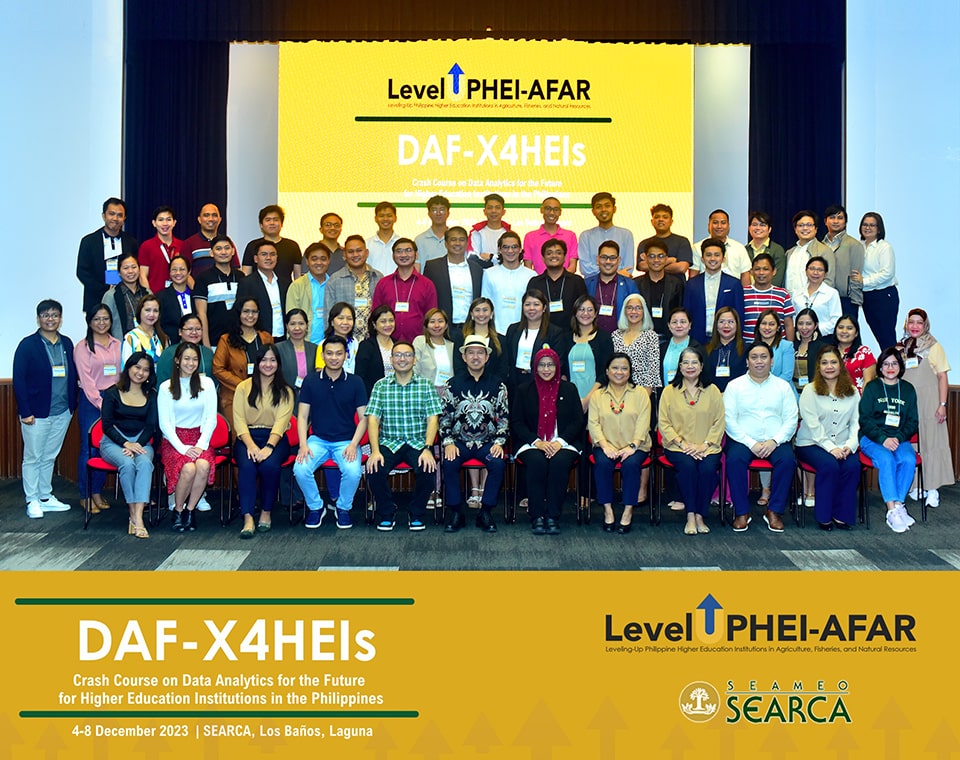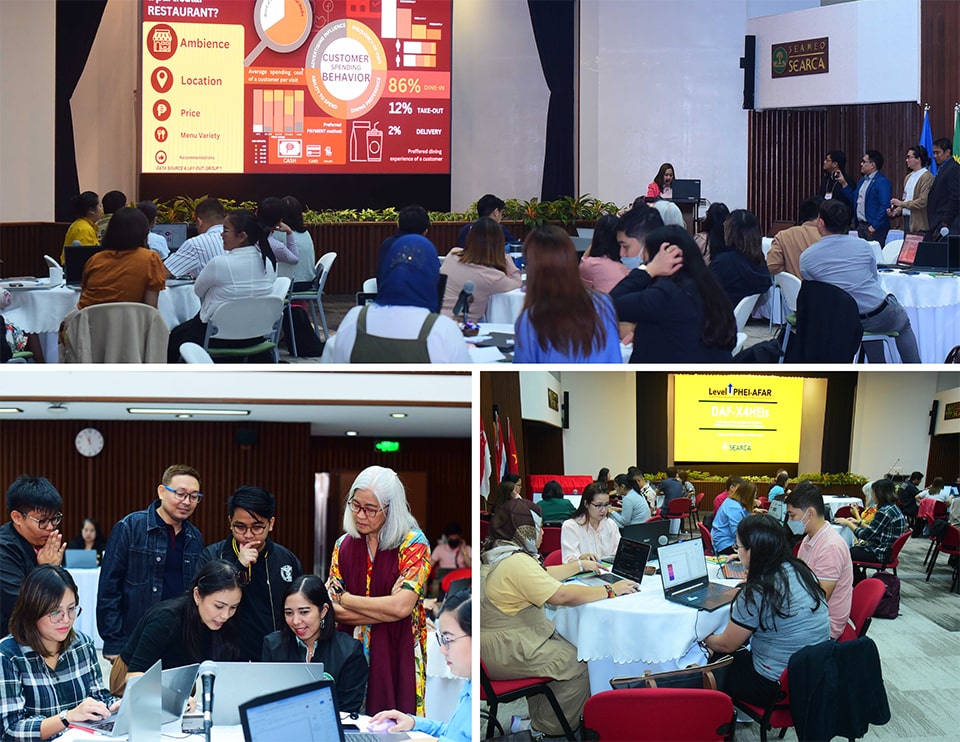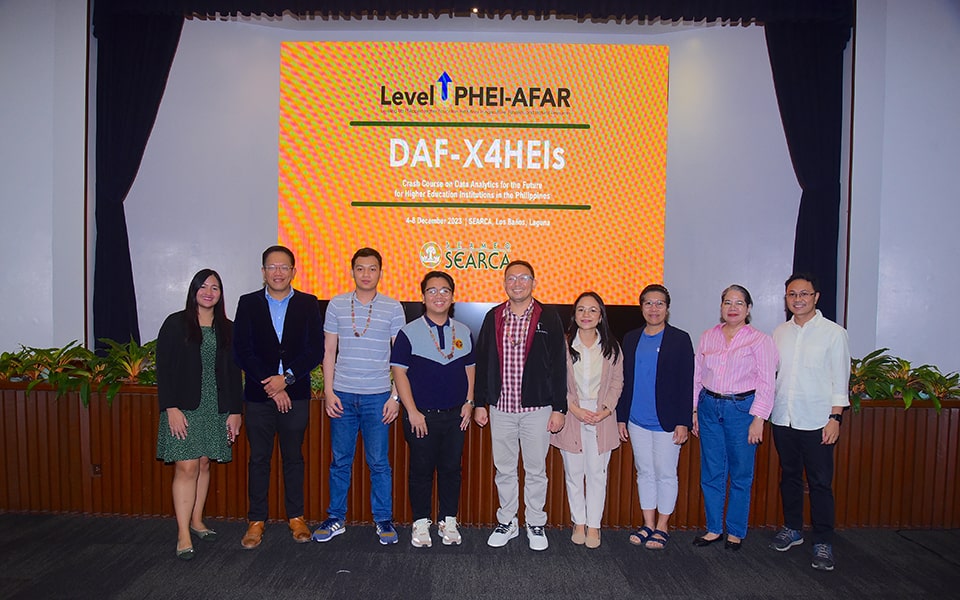 SEARCA officials, staff, and delegates of the DAF-X4HEIs course during the opening ceremony on 4 December 2023.
SEARCA officials, staff, and delegates of the DAF-X4HEIs course during the opening ceremony on 4 December 2023.
LOS BAÑOS, PHILIPPINES—The Southeast Asian Regional Center for Graduate Study and Research in Agriculture (SEARCA) conducted a training program on data analytics for faculty and staff of Philippine higher education institutions (HEIs) on 4–8 December 2023 at the SEARCA headquarters.
Titled "Crash Course on Data Analytics for the Future for Higher Education Institutions in the Philippines (DAF-X4HEIs)," this beginner-level program was attended by 38 participants from 17 members of the State Universities and Colleges-Association of Colleges of Agriculture in the Philippines, Inc. (SUC-ACAP). The training focused on data visualization techniques and freely available data analytics software.
"We offer this platform because we can get information and knowledge from data. We designed this course with hands-on exercises so you can apply the techniques immediately after the lecture," said Dr. Jomar Rabajante, DAF-X4HEIs technical coordinator. He is also the dean of the University of the Philippines Los Baños (UPLB) Graduate School and professor from the Institute of Mathematical Sciences and Physics (IMSP), College of Arts and Sciences.
Dr. Rabajante highlighted that data science usually follows a vertical trend that focuses on deepening the techniques and methods in creating theories and algorithms. On the other hand, the crash course aims to improve the horizontal trend, which is extending the breadth of data science.
"We are pushing for all sectors to benefit from data analytics, not just the computer science field, but also those in agriculture, research, and others," he added.
In his welcome message, SEARCA Director Dr. Glenn Gregorio, highlighted that the most powerful people now are in statistics. "Data can be translated to information and knowledge, but analytics gives you the power. Analytics makes you a winner," he said.
 The course participants engage in hands-on workshops and group exercises on data analytics.
The course participants engage in hands-on workshops and group exercises on data analytics.
Over the week, the participants attended sessions on key concepts in data science and data analytics, data storytelling, big data and data mining, simple machine learning algorithms, and basic statistic tools. On top of this, they also participated in several workshops using open-source data applications.
Guiding the participants were Emerson Rico and Norvin Bansilan, both assistant professors, and Ms. Leneth Sajulga, instructor, all of IMSP.
The first day of the training program covered theories on data science including the difference between data analysis and data analytics. Dr. Rabajante also discussed the workflow in data preparation, analytics, analysis, and visualization.
To further enhance the participants' skills with Google Looker Studio, Dr. Rabajante integrated the use of real-time survey data on the second day of the workshop. They were grouped to craft survey questionnaires out of the data collected from the dashboarding activity.
Meanwhile, Dr. Pamela Custodio, professor from the Department of Development Journalism, UPLB College of Development Communication, led the session on data storytelling. She talked about the components of a data story and some techniques for creating effective infographics.
"Data can be overwhelming and difficult to interpret but if we transform them into data stories, the data will become interesting and approachable," she said. The participants applied their learnings from the session by creating infographics from the collected survey data.
On the third day of the training-workshop, Prof. Rico introduced Orange, a toolkit for data visualization, machine learning, and data mining. The lesson was also paired with a guided step-by-step workshop for the participants.
It was followed by another lecture on the basics of data mining and machine learning methods, focusing on big data and basic statistics and how these are used in applications such as JASP, an open-source statistics program, and Social Network Visualizer.
On the last day, participants presented their outputs. Three volunteers, Ms. April Arianne De Leon of Southern Luzon State University, Ms. Heinecy Ann Morts of Nueva Vizcaya State University, and Dr. Ryan Escorial of Central Philippines State University, presented their respective outputs of the COVID-19 dashboard and their application of Orange to their research studies. This was followed by group presentations of the participants' collaborative outputs on the dashboard and infographics from the survey data.
"This course is very helpful for people like me who have zero knowledge on data analytics and programming" Ms. De Leon shared. "I started from zero, but it feels like I'm coming home as a hero because I have something very important to share with our colleagues," she added.
 The SEARCA training management group and resource speakers during the closing ceremony on 8 December 2023.
The SEARCA training management group and resource speakers during the closing ceremony on 8 December 2023.
Dr. Nova Ramos, SEARCA's head of training for development unit (T4DU), initiated the closing ceremony followed by Dr. Rabajante's synthesis of the week-long program. Dr. Ramos reminded the participants to share with SEARCA updates on their re-entry action plans, which is a requirement for them to cascade their learnings from the course to their home institutions.
Assoc. Prof. Joselito Florendo, the Center's deputy director for administration, concluded the event and expressed gratitude to SUC-ACAP and CHED, and to everyone who contributed to the success of the DAF-X4HEIs.